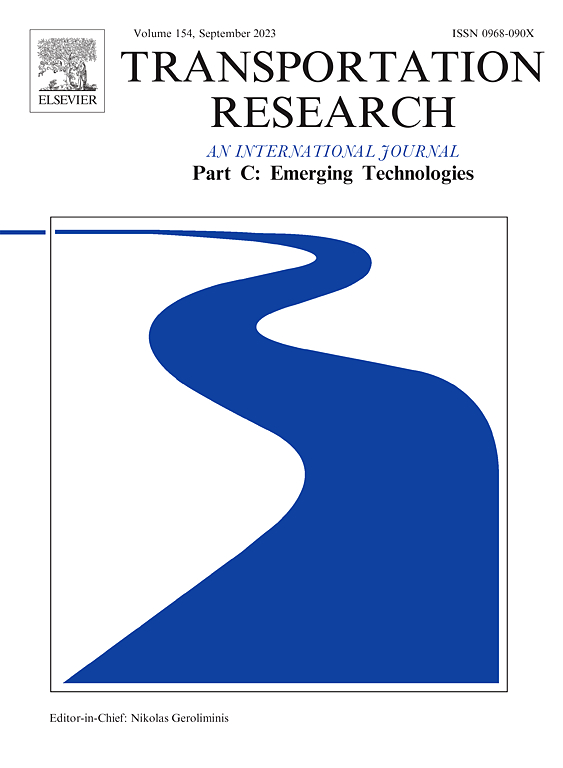The container drayage problem for electric trucks with charging resource constraints
IF 7.6
1区 工程技术
Q1 TRANSPORTATION SCIENCE & TECHNOLOGY
Transportation Research Part C-Emerging Technologies
Pub Date : 2025-03-22
DOI:10.1016/j.trc.2025.105100
引用次数: 0
Abstract
Amidst the ongoing green transformation in transportation, the electrification of trucks has emerged as a pivotal strategy to address climate-related issues. This paper introduces the container drayage problem for electric trucks, considering the charging resource constraints. Electric trucks are assigned to serve a series of origin–destination tasks between terminals and customers. Each truck can opt between battery swapping and two charging modes: normal and fast, each featuring a nonlinear charging process. The paper addresses the charging queueing problem arising from limitations in charging resources, presenting a novel mixed integer programming model tailored to container drayage challenges for electric trucks. To tackle this challenging problem, we propose an enhanced adaptive large neighborhood search algorithm that integrates an exact method. In the first stage, routes are generated based on customized procedures without considering queueing charging to minimize overall operation costs. The second stage is triggered by the call frequency and condition coefficient, utilizing CPLEX to optimize further queueing charging strategies. The algorithm is applied to instances based on real-world task data obtained from logistics companies. A series of comparative experiments are conducted to validate the efficacy and ascertain the parameter configuration of the algorithm. Furthermore, we examine the influence of charge levels and numbers of replaceable batteries on overall expenses and conduct a comprehensive analysis of the application influence of electric trucks compared to conventional fuel trucks in terms of cost and emissions.
求助全文
约1分钟内获得全文
求助全文
来源期刊
CiteScore
15.80
自引率
12.00%
发文量
332
审稿时长
64 days
期刊介绍:
Transportation Research: Part C (TR_C) is dedicated to showcasing high-quality, scholarly research that delves into the development, applications, and implications of transportation systems and emerging technologies. Our focus lies not solely on individual technologies, but rather on their broader implications for the planning, design, operation, control, maintenance, and rehabilitation of transportation systems, services, and components. In essence, the intellectual core of the journal revolves around the transportation aspect rather than the technology itself. We actively encourage the integration of quantitative methods from diverse fields such as operations research, control systems, complex networks, computer science, and artificial intelligence. Join us in exploring the intersection of transportation systems and emerging technologies to drive innovation and progress in the field.

 求助内容:
求助内容: 应助结果提醒方式:
应助结果提醒方式:


